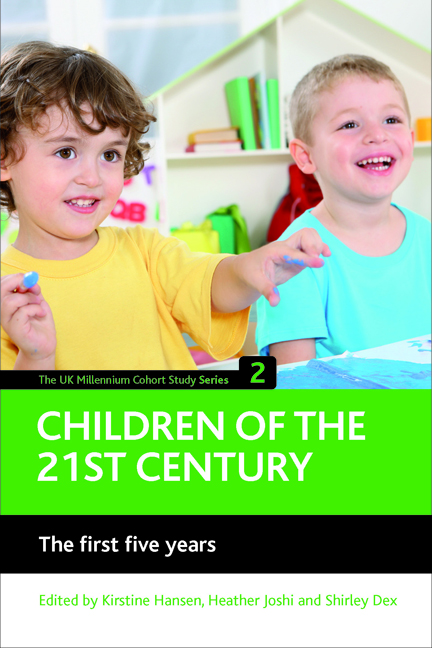Book contents
- Frontmatter
- Contents
- Acknowledgements
- List of contributors
- Glossary
- one Introduction
- two Child poverty in the first five years of life
- three Ethnicity, community and social capital
- four Parental relationships and parenting
- five Partnership trajectories, parent and child well-being
- six Employment trajectories and ethnic diversity
- seven Neighbourhoods and residential mobility
- eight Childcare in the pre-school years
- nine Intergenerational inequality in Early Years assessments
- ten Ethnic inequalities in child outcomes
- eleven School choice
- twelve Teacher assessments in the first year of school
- thirteen Childhood overweight and obesity
- fourteen Resilience in children's development
- fifteen Parental and child health
- sixteen Conclusions
- References
four - Parental relationships and parenting
Published online by Cambridge University Press: 01 September 2022
- Frontmatter
- Contents
- Acknowledgements
- List of contributors
- Glossary
- one Introduction
- two Child poverty in the first five years of life
- three Ethnicity, community and social capital
- four Parental relationships and parenting
- five Partnership trajectories, parent and child well-being
- six Employment trajectories and ethnic diversity
- seven Neighbourhoods and residential mobility
- eight Childcare in the pre-school years
- nine Intergenerational inequality in Early Years assessments
- ten Ethnic inequalities in child outcomes
- eleven School choice
- twelve Teacher assessments in the first year of school
- thirteen Childhood overweight and obesity
- fourteen Resilience in children's development
- fifteen Parental and child health
- sixteen Conclusions
- References
Summary
Introduction
A large body of research suggests that the quality of the relationship between parents is related to parenting behaviours, the interactions between parent and child and child behavioural and cognitive outcomes. The quality of a relationship may affect child outcomes directly or may have an effect through parenting behaviours – that is, relationship quality may affect parenting behaviours that in turn affect child outcomes. Theoretical models have been proposed to explain both direct and indirect pathways for such effects.
This chapter uses data from the Millennium Cohort Study (MCS) to examine the self-reported perceptions of parents about their relationships, how well they predict later break-up of relationships and whether they are related to parenting behaviours and to child outcomes at age 5.
Literature review
Conflict in the relationship between parents has been found to have an effect on parenting behaviours. Brody et al (1997) asked parents to give their perceptions of the level of conflict in their relationships with their spouses. Higher levels of perceived conflict were related to lower involvement with children and harsher parenting. Interparental conflict has also been found to be related to lower acceptance of children, less consistency in discipline and greater hostility in the parent–child relationship (Gonzales et al, 2000).
In a meta-analysis of research on the relationship between parents and its relation to parenting behaviours, Erel and Burman (1995) found that parents who reported lower levels of conflict and higher levels of satisfaction with the marital relationship were less likely to use emotional forms of control and less likely to use harsh discipline practices. Marital conflict was also found to have a moderate relationship with parents’ use of harsh discipline and lower acceptance of their children in a meta-analysis carried out by Krishnakumar and Buehler (2006).
In turn, parenting behaviours have an effect on child outcomes. An authoritarian parenting style, characterised by expectations that children unquestioningly obey parents, was found to be associated with overt aggression in children, while a permissive style was found to be associated with children's higher levels of relational aggression (Sandstrom, 2007). Having at least one authoritative parent was found to be related to lower levels of delinquency and depression and higher levels of school commitment in children (Simons and Conger, 2007).
- Type
- Chapter
- Information
- Children of the 21st century (Volume 2)The First Five Years, pp. 53 - 76Publisher: Bristol University PressPrint publication year: 2010



